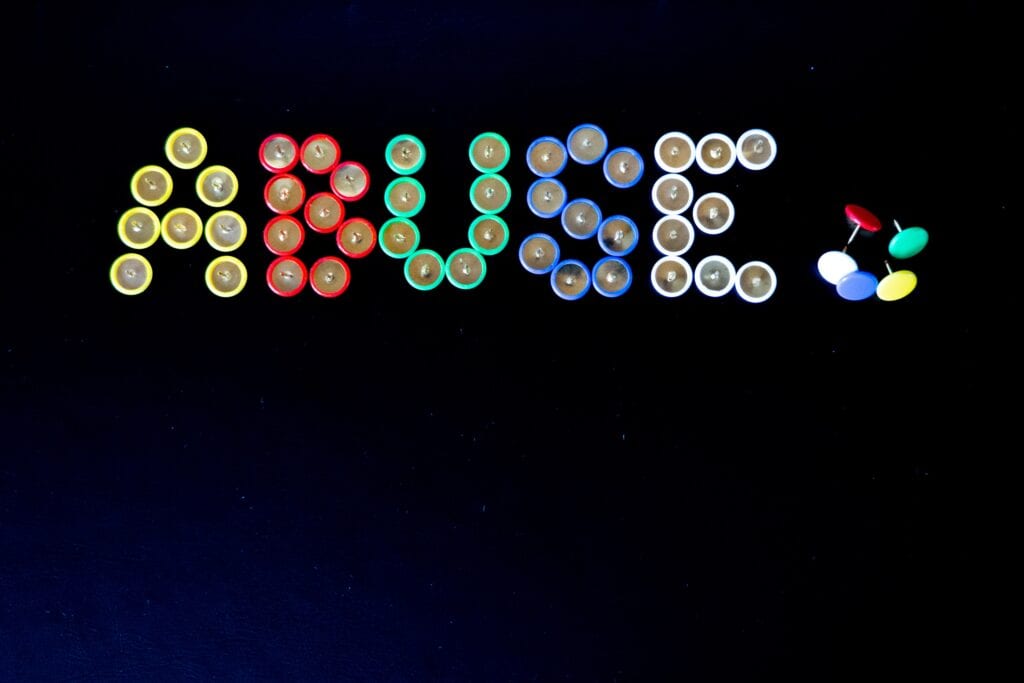
Most of us would assume that only people can be abusive but sometimes a group, system or organisation is hit by a perfect storm, resulting in an environment that harms people. Ironically, it isn’t only the users or customers of that organisation that can be hurt; those within are harmed too. The whole becomes greater than the parts, creating a culture with a life force and momentum all of its own.
So what makes an organisation abusive? I have compiled the following points after reading a number of articles about Organisational Abuse and thinking back over my two decades watching the NHS maternity system operate – as a doula and long term volunteer on an Maternity Services Liasison (now called Maternity Voices Partnership) committee. I have observed most of the points in this list and so have most of my friends and colleagues in the birth world, some of whom have provided the illustrative quotes below. This is by no means a definitive list: if you would like to add anything, or argue with me, please do feel free to comment below.
Unsafe, unhygienic or overcrowded environments
“The delivery beds are poorly designed and hard to clean and take a lot of time to disinfect properly. We often don’t have the time to carefully ensure all the blood has been washed off the beds. I once found a puddle of blood in the pool and another on the bed”
“We found a sharp on the floor.”
“The toilet was filthy and there was no toilet paper. I had to wash the bath before getting in it.”
Lack of privacy, dignity, and respect for people as individuals
“Every shift there seems to be staff who don’t seem to be able to empathise with the families they care for. I was involved with a stillbirth as an MSW and the midwife seemed irritated by the parents and lacking in compassion.”
“Staff are told they ‘must’ perform certain clinical tasks, for example taking observations, without being reminded that they have a duty to ask the patient’s consent.”
“The midwife kept opening my curtains and I was trying to learn to breastfeed. I felt so mortified and ashamed.”
“The door to the delivery room just kept opening with different people coming and going. It was so hot and I didn’t have many clothes on and I felt embarrassed every time a new person came in to look at the CTG or ask for the keys.”
Informed consent for service users not facilitated
“She told me to hop up for a sweep” (from the They Said To Me page)
“My legs were in stirrups in theatre and 4 different members of staff put their fingers inside me without introducing themselves.”
“Over the course of about 18 hours I had two pessaries inserted and two other vaginal examinations. On every single occasion the midwife would withdraw her hand and announce that she’d also given me a sweep whilst she was in there” (from the They Said To Me page)
“I transferred a client to hospital with a non-progressing labour after many hours of trying. As an independent midwife I had a rule of not rupturing membranes at home due to the potential risks involved, and the fact that its not usually the membranes halting progress.We transferred in and my client consented to vaginal examination by the doctor. Whilst examining her he looked at the NHS midwife and said “amnihook”. As she was getting it out the wrapper I quickly told my client “what the doctor is asking is would you like your waters broken?”
The doctor hesitated.
My client replied “do you think that is a good idea at this point?”
I reminded her of the discussions we had prior to transfer and she agreed to the intervention.
I am convinced that without my quick words there would have been no consent gained for this procedure.“
Strict, regimented routines or guidelines interpreted as rules or laws
“I wasn’t allowed to be discharged as I refused vitamin K. Was made to sign forms, watch videos and read literature, and my discharge was delayed 6 hours because of it. Was threatened with social services” (from the They Said To Me page)
Withdrawing people from community or family contacts
“My husband was told to leave and I was left, still unable to stand up, unable to reach my baby, not knowing what to do. I had to stay for 3 days and I was missing my first child so much.”
“My sister just gave birth. She hadn’t slept properly [for] 5 nights… I arrived with supplies plus I am a breastfeeding supporter on postnatal ward trained as a doula…Not allowed in as 1 visitor policy!
After much negotiation they let me in including my poor sister having an emotional breakdown, on the proviso her partner may no longer visit. And after all that they let her partner in with no issues today after I returned home.“
Lack of choice offered with food, drink, dress or activities
“I went to the shop and bought her a baguette and some fruit to eat as not one person offered her any food and the midwife threw it in the bin” (from the They Said To Me page)
“It was so late by the time I was able to get away and order food for the women in Delivery Unit that by then the catering assistant had stopped serving and there was no food left.” (Maternity Support Worker)
“Women are still restricted or discouraged from eating in labour in our hospital.”
No respect or lack of provisions for religion, belief, or cultural backgrounds
“I have a friend from my midwifery degree who is a Muslim. When we were measured and had to order our uniform she went through a tough time because our uniform did not coincide with how she was allowed to dress because of her religion (arms covered). Our uniform had to have bare arms, understandably for cleanliness reasons. She felt very conflicted but in the end, reluctantly agreed to the uniform policy.”
“My religion means that it is very hard for me to be cared for by a male doctor. I wasn’t given a choice in the matter and it was very worrying.”
“I was in labour and no one helped me cover my head when a man came into the room.”
Treating adults like children, including arbitrary decision-making, paternalism, patronising behaviour
“The reply I got was that I should still attend that appointment as that decision is up to the consultant” (from the They Said To Me page)
“When I was an Independent Midwife I inherited a client in late pregnancy because her midwife became seriously unwell. Her labour had progressed well until the second stage when she declined further support or advice from me in what eventually turned out to be a 10 hour second stage. We were all exhausted, and communications became fraught when baby developed concerning fetal heart rate patterns. I managed to persuade her into the ambulance and we arrived at the hospital. I was greeted by a midwife who greeted me with “don’t say anything, just stand in the corner” like I was a naughty schoolgirl. Sadly I was used to being treated like this, like someone who coerced or at least colluded with women to do dangerous things outside of guidelines.”
“The consultant said he wouldn’t let HIS wife make the decisions I was making.”
“The midwife kept calling me a ‘good girl’. I hated it.
Absence of team work, consensus or collaboration”
“There has been no lactation management training for staff since before covid. None of my colleagues feel confident or competent providing breastfeeding support.”
“When I make suggestions for improvements to the service I am ignored or receive long explanations as to why it would be impossible.”
Staff taken for granted, over worked, under paid and coerced by means of fear and threats
No one asked me if I was OK after I cared for a family who lost their baby.””
“I was told all the guidelines are evidence based and not to question anything.”
“I was told I couldn’t reduce my hours and was forced back from maternity leave before I was ready.”
“I was bullied and humiliated until I had to hand in my notice.””
“I was teased and isolated and called a hippy because I enjoyed working with women who wanted a natural birth.”
These are some of the signs of what is generally known as Organisational Abuse. This kind of abuse happens when a working environment or organisation becomes toxic and unsafe for both staff and service users. When ‘efficiency’ is considered more important than the feelings and needs of staff and those using the service, an organisation can inflict harm on those coming into contact with it.
That is not to say that every staff member or user of these services are being harmed or even having a bad time. Abuse happens arbitrarily – some areas are better than others, some departments have good times and bad times, some service users are more adept at getting what they need from the system.
An ex-midwife told me:
[We were] given reams of policies to read and work to, because “that’s how it’s done here.” [It} turns them into midwives who don’t question what they’ve been taught…I was put down more than once for questioning policies. I was motivated enough to…read research and put information forward. Midwives are always told they are autonomous practitioners, but try doing it your way…
[The} final straw was “it’s policy for women to deliver on the bed, not the floor.“
I made two attempts to return to midwifery. Each time it got worse – more policies, protecting staff, denying mothers choice!
So what causes an organisation to become abusive? When staff are inadequately trained and poorly supervised or mentored, when management is not supportive and empathetic, when high quality communication skills are not taught and modeled by senior management, staff become demoralised and customers or service users are left feeling confused, upset or angry. When the organisation becomes a ‘closed’ culture staff become isolated and innovation is stifled. The sharing of ideas is discouraged and collaboration between individuals, departments or different parts of the system becomes difficult or impossible.
But mainly, within the NHS right now, the main reason is under-funding and under-staffing. The whole edifice is being held up with sticky tape and sweat and unless the government injects a whole heap of money and resources really soon, there’s going to be a whole heap more pain inflicted on us all.

